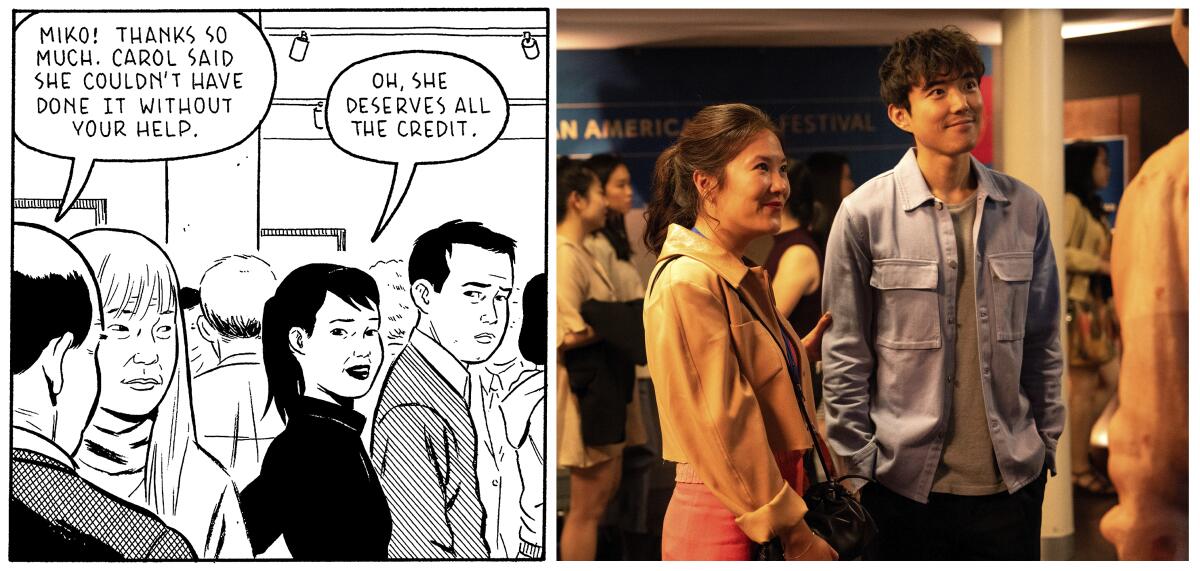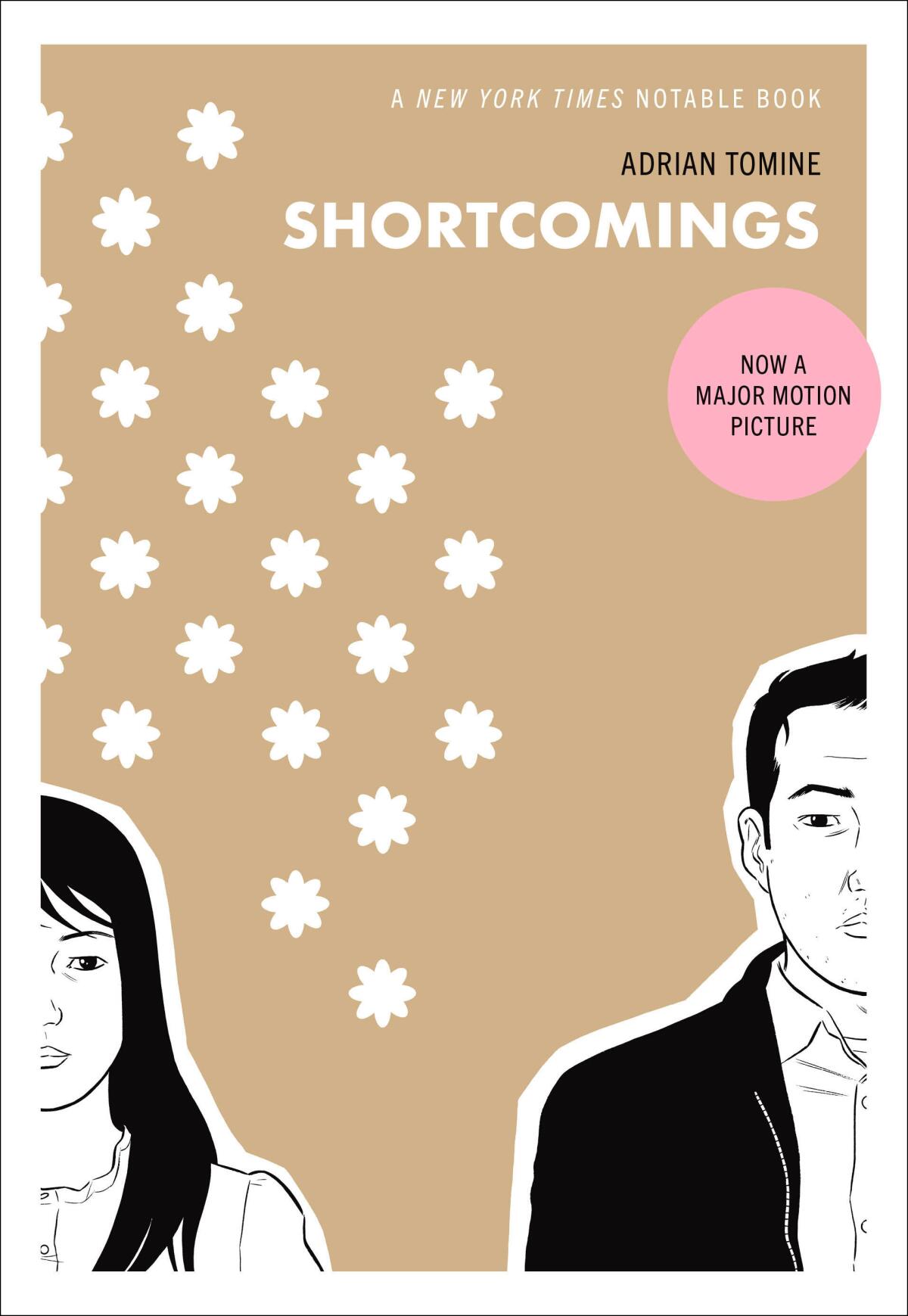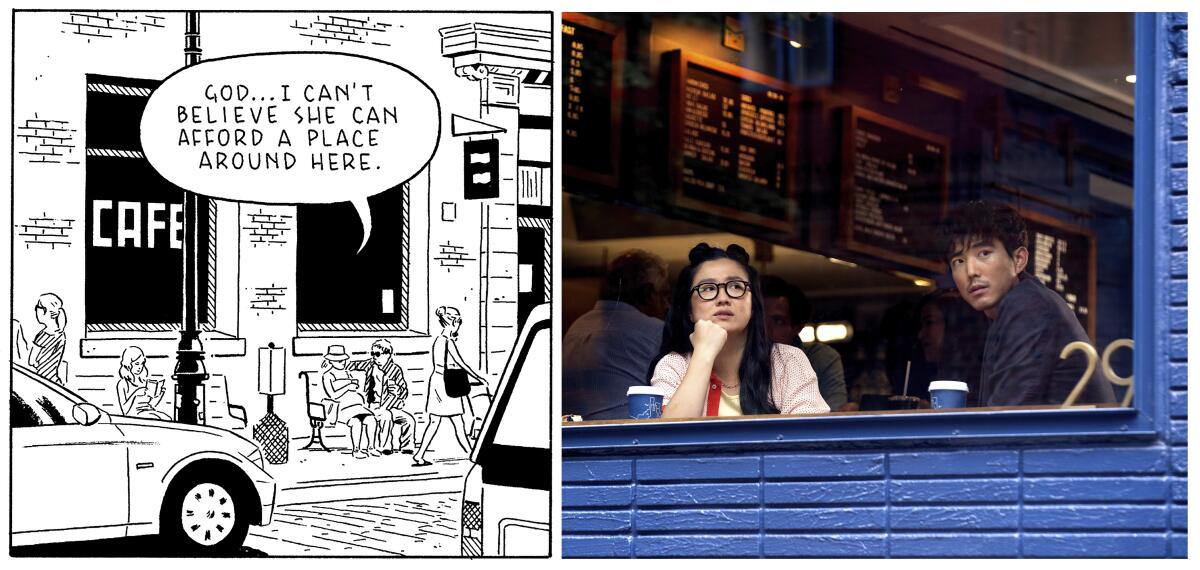Sign up for our Book Club newsletter
Get the latest news, events and more from the Los Angeles Times Book Club, and help us get L.A. reading and talking.
You may occasionally receive promotional content from the Los Angeles Times.

Psychotherapist Esther Perel has famously said, “The erotic mind is not very politically correct.” Social circumstances — our backgrounds, others’ perceptions of us, the messages we absorb — have the power to both shape and complicate our attractions.
In 2007, acclaimed cartoonist Adrian Tomine stepped directly into this breach with his classic graphic novel “Shortcomings.” The story, which first appeared from 2004 to 2007 as installments of his long-running “Optic Nerve” comic, departed from Tomine’s customary melancholic vignettes by leaning heavily into dialogue, acerbic humor and a plot arc that doesn’t demur from conflict — all at the charged intersection of race and sexuality.
Tomine scripted a new film adaptation, which Randall Park brings to life in full color, with nerve and nuance intact. The fluidity of the book’s move to the screen underlines the care Tomine takes in composing his panels. His agile update of the text refreshes its insights without blunting them, making a sterling case for author adaptations.
Judy Blume, James L. Brooks and Kelly Fremon Craig hash out — and argue over — how they finally came to adapt “Are Your There God? It’s Me, Margaret.”
Ben (Justin Min) and his longtime girlfriend Miko (Ally Maki) are both 30-ish Japanese Americans living in the East Bay and working in film exhibition: Ben manages an indie theater and Miko promotes Asian American films. Their relationship is strained by Ben’s bottomless negativity and his sexual fixation on white women (in the book’s less Mattel-hypnotized time, Miko angrily calls them “Barbie dolls”).

Miko goes to New York for the summer, supposedly for work, and Ben sets about trying to sleep with a blonde, any blonde, feigning interest in the lives of several prospects. Repeatedly foiled by his own toxicity, he follows his lesbian best friend Alice (reliably winsome Sherry Cola) when she too travels to New York. There, he’s enraged to discover that Miko is shacking up with a white guy who himself is obsessed with all things Asian. Reckoning ensues, in its multitextured, unavoidable and finally fruitful glory.
While “comic book movies” might summon to mind big-budget franchise fare, live-action versions of realist graphic novels constitute a healthy subgenre. The best reference points for this one may be Marielle Heller’s wonderful “The Diary of a Teenage Girl” (2015), based on Phoebe Gloeckner’s auto-fictional novel of ’70s San Francisco, and Terry Zwigoff’s cult hit “Ghost World” (2001), based on stories from Daniel Clowes’ “Eightball” series. Clowes, Tomine’s friend and mentor, co-wrote the script for the latter film.
Two years ago, Jacques Audiard adapted three of Tomine’s vignettes in “Paris, 13th District,” injecting a male-led love triangle that diluted the stories’ cohesion and impact — though a writing contribution from Céline Sciamma salvaged one of its storylines. Where “Ghost World” was concerned with its own quirky hipness and “Paris” with undressing its women, Park’s “Shortcomings” feels immediate and personal.
For Bay Area natives of a certain age, the film’s settings, subcultures and music will ring true. The characters are instantly recognizable, and the story remains frank with their foibles. Raffish Alice and the other women provide welcome respite from Ben’s puerile petulance. While it’s still Ben’s journey, Park gives them each a well-deserved bow in a coda with Alice’s voice. It’s an accomplished directing debut for Park, who co-wrote and starred in “Always Be My Maybe” and appeared in the series “Fresh Off the Boat.”
It’s a sunny Friday morning in downtown Culver City and Ali Wong is adamantly trying to convince Randall Park, her costar and collaborator in the romantic comedy “Always Be My Maybe,” that his life is about to change.
Tomine’s script smoothly accommodates developments since the book’s release. On the film front, that means “Crazy Rich Asians” and the superhero takeover. In the social realm, it includes inescapable smartphones and more awareness of boundaries on dates. His script doesn’t get quite as raw as the book; it leaves out Ben’s titular penis-size anxieties. But as Jeremy O. Harris’ stage hit “Slave Play” has reminded us in recent years, heated arguments about fetishism, assimilation and otherness aren’t at all abstract when it comes to dating interracially.

The social-romantic collision course doesn’t end there, either. Alice isn’t out to her religious Korean family, and has Ben pose as her boyfriend on a visit. The gambit fails to please them, thanks to the long shadow of Japanese colonial rule. And bisexuals will feel familiar hurt at the way Ben and Alice treat Ben’s conquest, Sasha, over her sexuality. It’s ultimately a comedy, though, and just like the book, Park’s film makes us laugh helplessly even as we squirm.
For fans of Tomine’s work, the most mesmerizing thing may be the near-seamless way the book becomes a meticulous storyboard. Some have said that Tomine thinks like a filmmaker, and indeed, so much direction is already there on the page: the establishing shots to orient us in the spaces of his scenes, the shot-reverse-shot conversations, tight focus and natural pauses, spare frames to mark the passing of time. The film isn’t a shot-by-shot recreation, but some scenes come uncannily close, while feeling as natural as they do in the text. Park and his crew ensure that there’s not a false or neglected detail, and shots with reflecting glass by DP Santiago Gonzalez nod to the great Edward Yang.
Starting with the changing industry landscape around Ben and Miko, “Shortcomings” is also a film about film, without being obtrusively “meta.” Ben talks about having wanted to be the next Eric Rohmer; Jonathan Lethem wrote jacket copy likening the book’s style to Rohmer’s.
Not only does Noah Baumbach successfully adapt Don DeLillo’s supposedly unfilmable ‘White Noise,’ he infuses it with innocence, fun and visual splendor.
The movie also acknowledges rom-com tropes, adding a last-minute, airport-bound quest with a big wink, and takes its place in the genre pantheon. Ur-teen influencer Tavi Gevinson fulfills the “manic pixie” role. Timothy Simons plays Miko’s lover, whose Bruce Lee moves will trigger audience-wide face-palm (here’s betting we all know the guy).

Independent comix have long been a place for all kinds of awkward honesty, especially for outsiders. Think of Alison Bechdel’s “Dykes to Watch Out For,” the Bros. Hernandez’s “Love and Rockets,” the work of Aline Kominsky-Crumb. Within Tomine’s oeuvre, the intimate authenticity of “Shortcomings” set the stage for his soul-baring, sidesplitting memoir, “The Loneliness of the Long-Distance Cartoonist” (2020).
Much has already been made of gleefully brazen July release “Joy Ride” and how it’s marked a new milestone in Asian American representation. “Shortcomings,” with its casual candor, is free from pressure to be outrageous about its characters’ sex lives. The film shows both Tomine and Park to be versatile as storytellers, and sets a new benchmark for graphic novel adaptations of its kind. One can only wish that our own worst moments might be captured with so much grace.
Johnson writes the Page to Screen column for The Times. Her work has appeared in the Guardian, the New York Times, Los Angeles Review of Books, the Believer and elsewhere.
Sign up for our Book Club newsletter
Get the latest news, events and more from the Los Angeles Times Book Club, and help us get L.A. reading and talking.
You may occasionally receive promotional content from the Los Angeles Times.